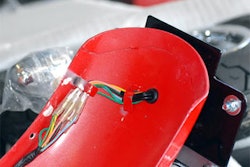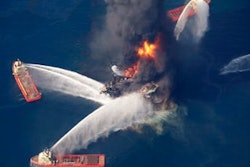MORGANTOWN, W.Va. (AP) — President Barack Obama and the U.S. Department of Energy are committed to a role for coal in a national energy strategy, and they've backed it up with research spending, Energy Secretary Ernest Moniz said Monday.
In a visit to the National Energy Technology Laboratory in Morgantown — the only one of the federal government's 17 national labs dedicated to fossil fuels — Moniz said the administration has spent $6 billion on clean-coal technology with an emphasis on the capture, storage and reuse of carbon emissions.
"We have an 'all of the above' strategy, and it's real," he said.
But the administration also believes the U.S. must prepare for a low-carbon economy, so scientists must help find ways to use coal and gas more cleanly.
Moniz spoke to hundreds of federal employees who work at the West Virginia lab, and to those who watched remotely from research sites and small offices in Pennsylvania, Oregon, Alaska and Texas. In all, the national lab employs 1,426 people, about 850 of whom are contractors.
Last month, Obama laid out a general plan to reduce greenhouse gas emissions and increase both the production of clean energy and energy efficiency.
That worries the coal industry and angers some of the politicians who support it, including U.S. Rep. David McKinley, a West Virginia Republican who has long questioned the science behind global warming. McKinley, who now acknowledges climate change but is not convinced human activity is to blame, accompanied Moniz on a tour of the lab but didn't speak to reporters.
Moniz said the challenges from climate change are serious. The world is already seeing the effects in more severe floods, heat waves and droughts that drive up food and energy prices. Rising temperatures also stoke more intense storms that threaten electrical grids and other key infrastructure.
"But we've always found a way to innovate our way to a more prosperous future," Moniz said, "and we will do the same in this case."
Coal and natural gas industry officials have joked about the president's commitment to an "all of the above strategy," suggesting he means all energy sources aboveground. Moniz acknowledged the skepticism in coal country but insisted the commitment is genuine.
He wouldn't predict how big the role for coal might be, saying that's up to consumers. But it will remain part of the fuel mix for decades to come.
"Our job is to see the marketplace has choices that are as economical as possible," Moniz said. "Our job is not to pick market shares; it's to provide choices."
Although viable clean-coal technology for power plants could be 15 years from deployment, Moniz said the work must be done now to keep coal competitive.
Coal consumption is up this year over 2012, he said, because rising gas prices made it competitive.
"The market is doing a little rebalancing," Moniz said.
The U.S. has doubled production of wind and solar power in the past four years, he said, yet coal and other fossil fuels account for 80 percent of all energy production and 70 percent of electricity production. That makes the need to innovate critical.
The Energy Department "is going to be the place to be over the next few years, as far as challenges go," he said, comparing the work ahead to natural gas research done in the 1970s that helped spawn the ongoing boom in deep, unconventional shale-gas drilling.
"It takes time to see the results," Moniz said, "but boy, are we seeing them in spades today for our economy."
Government-led gas research had several critical components that Moniz said also must apply to coal: Public-private partnerships with universities and industry; demonstration projects; and limited-time tax incentives to apply new technologies.
"We need to do more of this," he said.
Moniz said the Energy Department also needs to work closely with states and regions, all of which have different needs, resources and regulatory structures, because one-size-fits-all approaches to climate change won't work.
Some states, for example, may want to focus on energy efficiency, he said, or changing consumer habits to reduce their consumption. McKinley, he noted, is advocating such legislation in the House, and many states have done work in that area that could help the federal government.






















